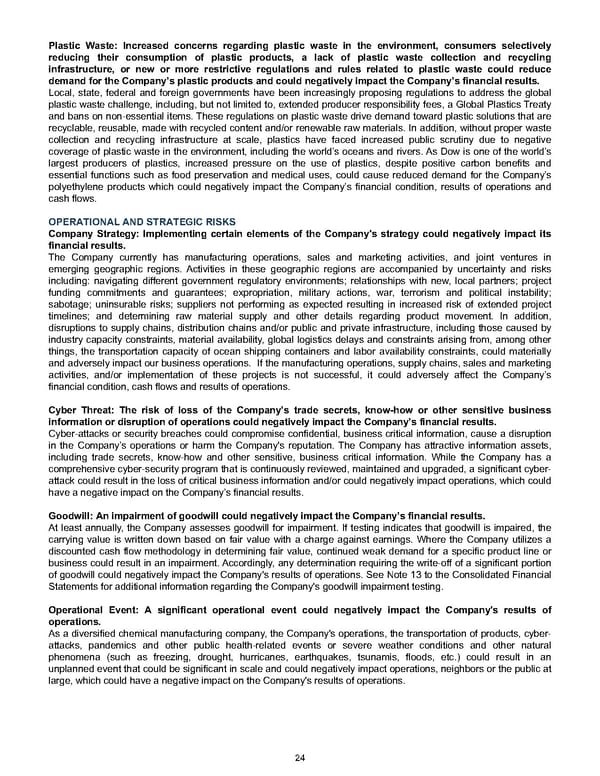Plastic Waste: Increased concerns regarding plastic waste in the environment, consumers selectively reducing their consumption of plastic products, a lack of plastic waste collection and recycling infrastructure, or new or more restrictive regulations and rules related to plastic waste could reduce demand for the Company’s plastic products and could negatively impact the Company’s financial results. Local, state, federal and foreign governments have been increasingly proposing regulations to address the global plastic waste challenge, including, but not limited to, extended producer responsibility fees, a Global Plastics Treaty and bans on non-essential items. These regulations on plastic waste drive demand toward plastic solutions that are recyclable, reusable, made with recycled content and/or renewable raw materials. In addition, without proper waste collection and recycling infrastructure at scale, plastics have faced increased public scrutiny due to negative coverage of plastic waste in the environment, including the world’s oceans and rivers. As Dow is one of the world’s largest producers of plastics, increased pressure on the use of plastics, despite positive carbon benefits and essential functions such as food preservation and medical uses, could cause reduced demand for the Company’s polyethylene products which could negatively impact the Company’s financial condition, results of operations and cash flows. OPERATIONAL AND STRATEGIC RISKS Company Strategy: Implementing certain elements of the Company's strategy could negatively impact its financial results. The Company currently has manufacturing operations, sales and marketing activities, and joint ventures in emerging geographic regions. Activities in these geographic regions are accompanied by uncertainty and risks including: navigating different government regulatory environments; relationships with new, local partners; project funding commitments and guarantees; expropriation, military actions, war, terrorism and political instability; sabotage; uninsurable risks; suppliers not performing as expected resulting in increased risk of extended project timelines; and determining raw material supply and other details regarding product movement. In addition, disruptions to supply chains, distribution chains and/or public and private infrastructure, including those caused by industry capacity constraints, material availability, global logistics delays and constraints arising from, among other things, the transportation capacity of ocean shipping containers and labor availability constraints, could materially and adversely impact our business operations. If the manufacturing operations, supply chains, sales and marketing activities, and/or implementation of these projects is not successful, it could adversely affect the Company’s financial condition, cash flows and results of operations. Cyber Threat: The risk of loss of the Company’s trade secrets, know-how or other sensitive business information or disruption of operations could negatively impact the Company’s financial results. Cyber-attacks or security breaches could compromise confidential, business critical information, cause a disruption in the Company’s operations or harm the Company's reputation. The Company has attractive information assets, including trade secrets, know-how and other sensitive, business critical information. While the Company has a comprehensive cyber-security program that is continuously reviewed, maintained and upgraded, a significant cyber- attack could result in the loss of critical business information and/or could negatively impact operations, which could have a negative impact on the Company’s financial results. Goodwill: An impairment of goodwill could negatively impact the Company’s financial results. At least annually, the Company assesses goodwill for impairment. If testing indicates that goodwill is impaired, the carrying value is written down based on fair value with a charge against earnings. Where the Company utilizes a discounted cash flow methodology in determining fair value, continued weak demand for a specific product line or business could result in an impairment. Accordingly, any determination requiring the write-off of a significant portion of goodwill could negatively impact the Company's results of operations. See Note 13 to the Consolidated Financial Statements for additional information regarding the Company's goodwill impairment testing. Operational Event: A significant operational event could negatively impact the Company's results of operations. As a diversified chemical manufacturing company, the Company's operations, the transportation of products, cyber- attacks, pandemics and other public health-related events or severe weather conditions and other natural phenomena (such as freezing, drought, hurricanes, earthquakes, tsunamis, floods, etc.) could result in an unplanned event that could be significant in scale and could negatively impact operations, neighbors or the public at large, which could have a negative impact on the Company's results of operations. 24
 Annual Report Page 33 Page 35
Annual Report Page 33 Page 35